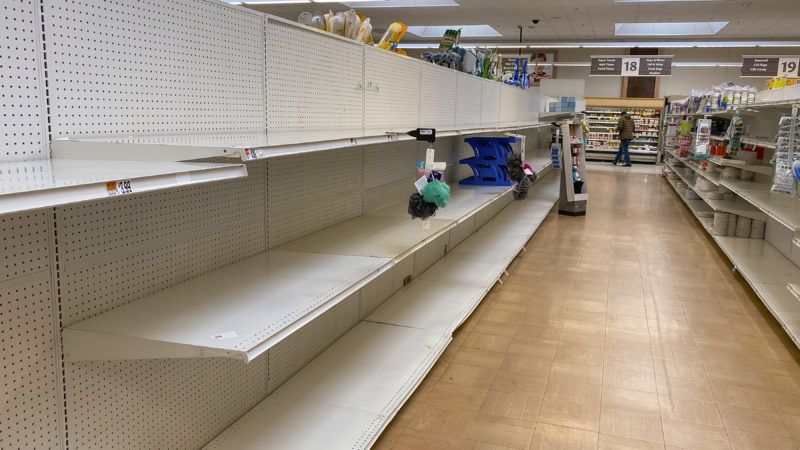Truckers Are Rushing Supplies to Empty Store Shelves During Coronavirus Crisis. Will Regulators Get Out of the Way?
The churn of new emergency regulatory waivers and restrictions is causing confusion for American manufacturers and freight haulers.

America's freight industry has been working double-time during this coronavirus crisis, shipping fresh supplies to grocery stores and pharmacies that have been picked bare by shoppers preparing to shelter-in-place for the foreseeable future.
To keep the supply chain unbroken under these extraordinary circumstances, both the federal and state governments have been waiving restrictions on truck drivers and rail operators. That regulatory relief is welcome, but industry groups say it doesn't go far enough, and that some measures being taken are actively harming their efforts to get essential goods to their destination.
On Saturday, the Federal Railroad Administration (FRA) officially declared an emergency, allowing rail operators to request up to 60-day waivers of regulations they can show are getting in the way of their ability to respond to COVID-19.
That move mirrored actions taken by the Federal Motor Carrier Safety Administration (FMCSA), which on Friday took the extraordinary step of waiving maximum hours rules until April 12 for truck drivers carry essential supplies.
The FMCSA will routinely lift these hours of service (HOS) rules for truck drivers carrying relief supplies like water and food to natural disaster-stricken areas. The agency's Friday nationwide waiver might be unprecedented.
"I don't know of any other situation where there's been a nationwide exemption," says Norita Taylor of the Owner-Operator Independent Drivers Association (OOIDA). "This is uncharted territory with the kind of emergency that's been declared."
Under normal circumstances, cargo-carrying drivers are permitted to be on the clock for 14 hours a day, which includes 11 hours of driving and several mandated breaks. They can also only be on-duty for 70 hours over a consecutive eight-day period before they are required to rest for 34 hours. Drivers carrying passengers can drive only 10 hours each day.
The FMCSA's emergency waiver permits drivers to bypass these hours restrictions so long as they are exclusively carrying essential supplies like medicine, masks, food needed for "emergency restocking," and government or medical personal. "Routine" commercial deliveries are still subject to standard HOS rules, as are drivers carrying mixed loads of essential and non-essential goods.
State governments have followed suit by waiving their own HOS regulations, as well as registration and weigh-in requirements.
Industry groups have cheered on these efforts, while also expressing frustration at the ambiguity of the regulatory waivers being issued at all levels of government.
"Trucks are delivering vital supplies to communities now, but confusion and lack of clarity are causing delays and problems," said American Trucking Associations (ATA) President Chris Spear in a Tuesday letter to President Donald Trump and Vice President Mike Pence asking for clearer and more sweeping regulatory waivers.
For instance, what counts as a "routine," and therefore unexempted, commercial delivery is undefined in the FMCSA order. "We're at a loss in terms of interpreting what Friday's announcement meant," one trucking executive told FreightWaves on Tuesday. "You can go into a lot of stores right now and see no meat, or dairy products wiped off the shelves as well—so are those considered emergency supplies?"
Taylor says that the FCMSA has held calls with trucking industry members to help clear up the confusion. Then this afternoon, the FCMSA issued an expanded emergency declaration that clarifies shipments of "paper products" (i.e. toilet paper) qualify for regulatory exemptions.
There are still a lot of details that need to be ironed out, says Tom Madrecki, Vice President of Supply Chains at the Consumer Brand Association. "If we take supply chains for granted, it's easy to discount everything that it touches" when crafting emergency policies, he says.
Madrecki points to the bans on large crowds that local and state governments are imposing. Some do not clarify if employees at manufacturing facilities are exempt, leaving companies wondering if they can continue production to keep up with demand.
Curfews that don't explicitly exempt delivery drivers are another problem area for the supply chain, says Madrecki, as are the closures of government offices and public facilities. Some states have closed DMVs without granting exemptions or extensions for expiring driver's licenses, leaving some commercial drivers with expired licenses wondering whether they are allowed to be on the road or not.
Some closures have been actively harmful to truck drivers. On Monday, the Pennsylvania Department of Transportation (PennDOT) ordered the state's rest stops closed, creating a major problem for drivers transversing the state.
"From an outside perspective, it might make sense," said Brandon Moree of the Pennsylvania Motor Truck Association. "But obviously those areas are vital for truck drivers who need to have a place to park for their 30-minute break or whether it be for their end of shift time off for the night. Not having those places have been a very difficult challenge."
After lobbying from truckers, PennDot announced this afternoon that they would open 13 of the state's 30 rest stops that they identified as being most likely to be used by truckers.
The confusing churn of restrictions and regulatory waivers being issued at all levels of government, while understandable, is creating undue confusion, says Madrecki. Officials need to "establish some uniformity and it needs to happen really quickly. There needs to be that federal leadership," in deciding what uniform policies should look like, he says.
So far it appears regulators are being responsive to problems or confusion their coronavirus-related dictates have created. That so many waivers are needed to keep goods flowing suggests that we came into this crisis way over-regulated. The fact that even necessary crisis-related restrictions have unintended consequences should humble policymakers as they try to mitigate the virus's spread.
Rent Free is a weekly newsletter from Christian Britschgi on urbanism and the fight for less regulation, more housing, more property rights, and more freedom in America's cities.


Show Comments (30)